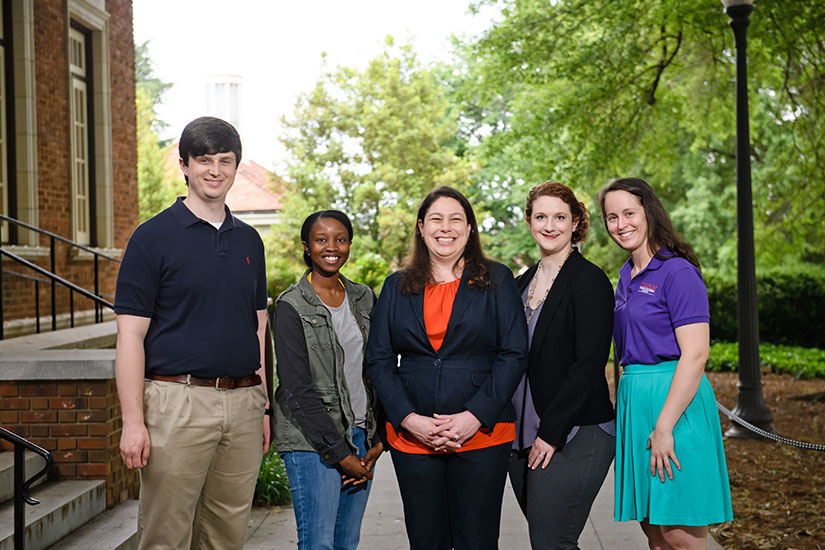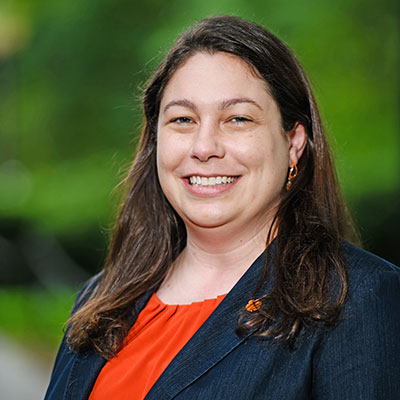Orr Group
Student Pathways in STEM Education
Marisa K. Orr is an Assistant Professor in Engineering and Science Education. Her research interests include student progress, persistence, and pathways in engineering, with a particular interest in how these pathways vary by race, gender, socioeconomic status, and engineering discipline. Dr. Orr is a recipient of the NSF CAREER Award for her research entitled, "Empowering Students to be Adaptive Decision-Makers."

Research Projects
Explaining Choice, Persistence, and Attrition of Black Students in Electrical, Computer, and Mechanical Engineering
Funding Agency: National Science Foundation
Summary: The project aims to enhance understanding of the policies and practices that promote persistence and graduation as well as attrition for Black students in Electrical Engineering (EE), Computer Engineering (CpE), and Mechanical Engineering (ME). The qualitative portion of our study seeks to explore in depth the causes of the observed differences while our quantitative study explores whether the findings of the earlier research are consistent over time and with a broader set of institutions. Our transformative mixed-methods project responds to calls for more cross-institutional qualitative and longitudinal studies of minorities in engineering education.
Collaborators: Catherine Mobley (Clemson University), Catherine E. Brawner (Research Triangle Educational Consultants), Rebecca Brent (Education Designs, Inc.)
CAREER: Empowering students to be adaptive decision-makers
Funding Agency: National Science Foundation
Summary: The objective of this project is to help students learn to make academic decisions that lead to success. It contains both practical components (identifying pathways that students take in a particular curriculum) and theoretical (understanding how self-regulated learning and decision-making affect real-life choices). The research itself will have a broader impact as it will influence policy locally and how policy decisions are made in engineering programs across the U.S. This project is unique because it packages the research findings not only for other researchers but also for direct student use. An online Academic Dashboard will be developed to help students leverage the research results and put them in the driver's seat of their education. It is expected that these skills will be especially beneficial for students from low-performing high schools who have never been challenged academically before. The result will be students who self-regulate their decision-making process to 1) choose paths that are most likely to lead to success and 2) make adaptive daily choices that help them achieve their goals.
This project seeks to advance understanding of academic pathways, achievement, and self-regulation in engineering. Students who persist in a major but never progress to graduation are of particular interest. Preliminary work has shown that the students who remain in college the longest without graduating are also the least likely to change majors. I will use a multi-faceted approach to both study and assist these students who persist but do not progress through the lens of self-regulation, with a particular focus on the self-regulation model of decision making and self-regulated learning. The research goals are to 1) identify curriculum-specific patterns of achievement that eventually lead to dropout and corresponding alternative paths that could lead to success and 2) advance knowledge of self-regulation patterns and outcomes in engineering students. The education goals are to develop curricula and advising materials that help students effectively self-regulate their decision processes through contextual activities and story prompts.
Collaborators: Marita (Mitzi) Apter-Desselles (Louisiana Tech University).
Expanding Access to and Participation in the Multiple Institution Database for Investigating Engineering Longitudinal Development
Funding Agency: National Science Foundation
Summary: This project seeks to expand the number of institutions participating in The Multiple-Institution Database for Investigating Longitudinal Development (MIDFIELD). MIDFIELD is a resource enabling the study of students that includes longitudinal, whole population data for multiple institutions. Retention, measured in various ways, has been the dominant mode of studying student success in engineering education and higher education in general. However, simply studying who matriculates and graduates does not tell the complete story of a student's path through the engineering curriculum, nor should it be used to measure an institution. A national, longitudinal student unit-record database would enable the study of engineering programs and benchmark metrics consistently. MIDFIELD has already been proven to facilitate data on student matriculation habits disaggregated across various engineering disciplines, ethnicities and genders. However, its value as a predictive tool has also been somewhat limited due to the small (eleven) number of institutions that have provided their student data.
This project will enable the expansion of the MIDFIELD database to include a total of 103 institutions. With input from university data managers, engineering education administrators, specialists in high volume data archiving and the community of researchers, this work will result in a database containing over 1.05 million students. More specifically, the data will represent over 50% of the U.S. engineering undergraduate degrees awarded and increase the diversity of institutions in the dataset. MIDFIELD will now include public and private institutions, minority-serving institutions, and institutions from a broad range of research classifications. The sheer scope and longitude of MIDFIELD will enable significant improvements in research in higher education. It will enable the development of research capacity to examine student characteristics (race/ethnicity/gender/social class) and curricular pathways (including coursework) by an institution and over time. Furthermore, this project will utilize workshops as well as asynchronous training modules to educate the broader research community, expanding the network of researchers capable of conducting this research and the sharing of innovative research methods in addition to the actual data. Finally, because the dataset contains students records of all students matriculating over a period of time, researchers can study students across all disciplines, not solely engineering.
Due to the broad nature of the disciplines represented by MIDFIELD, this project has cross-Directorate support from the Directorates of Engineering, Math and Physical Sciences (MPS), and Education and Human Resources (EHR) as well as the Office of Integrative Activities (OIA). Within the MPS Directorate, this work is supported by Astronomy and Physics; within EHR, this work is supported by the EHR Core Research (ECR) program. The ECR program emphasizes fundamental STEM education research that generates foundational knowledge in the field. Investments are made in critical areas that are essential, broad and enduring: STEM learning and STEM learning environments, broadening participation in STEM, and STEM workforce development.
Collaborators: Matthew Ohland (PI, Purdue University), Susan Lord (University of San Diego), Russell Long (Purdue University), Catherine Brawner (Research Triangle Educational Consultants).
Sophomore Fast-Forward: A Summer Bridge Program to Support Retention in Engineering
Funding Agency: National Science Foundation
Summary: This National Science Foundation (NSF) Scholarships in Science, Technology, Engineering, and Mathematics (S-STEM) project at Louisiana Technological University will increase the timely baccalaureate degree completion rate among students majoring in mechanical, biomedical, and civil engineering. The program's overall objective is to increase engineering retention, leading to an increase in the number of STEM graduates prepared to enter the workforce and be successful. The program offers scholarships for rising sophomores who demonstrate academic talent and financial need. Support includes attendance in a full-time summer session in which students will take some of the required engineering and mathematics courses normally taken during the Fall semester. This approach will provide a smoother transition into more difficult engineering coursework for this at-risk group. This program will include professional and student development activities, as well as mentoring from faculty. Scholarships and support for low-income and academically talented students, who may not otherwise be able to obtain engineering degrees, will help produce a well-trained STEM workforce that will contribute to the economic wellbeing of the nation.
The project is based on the identification of a critical attrition point in the undergraduate engineering curriculum. Louisiana Tech has identified the engineering statics course as the point at which many otherwise promising students leave engineering due to poor performance. However, the failure rate for students taking statics during the summer session is substantially lower than for the Fall semester. The project will investigate the hypothesis that encouraging talented but at-risk students to pursue statics during a full-time summer session will facilitate these at-risk students in overcoming this identified attrition point in the undergraduate engineering curriculum. Retaining more students in the critical sophomore transition will result in more STEM graduates. The cohorts of S-STEM Scholars will be mentored by a faculty team and participate in other support activities, including industry field trips, professional development training and team-building activities. The findings from the program will be disseminated widely to the STEM education community and will help increase understanding of the attributes and practices of successful student scholarship and support programs for academically talented, low-income engineering students.
Collaborators: Katie Evans (P.I., Louisiana Tech University), Heath Tims (Louisiana Tech University), David Hall (Louisiana Tech University), Marita (Mitzi), Apter-Desselles (Louisiana Tech University).

Assistant Professor
Department of Engineering & Science Education
Department of Mechanical Engineering
Offices: 263 Sirrine Hall/227 Fluor Daniel EIB
Phone: (864) 656-4317
Email: marisak@clemson.edu
